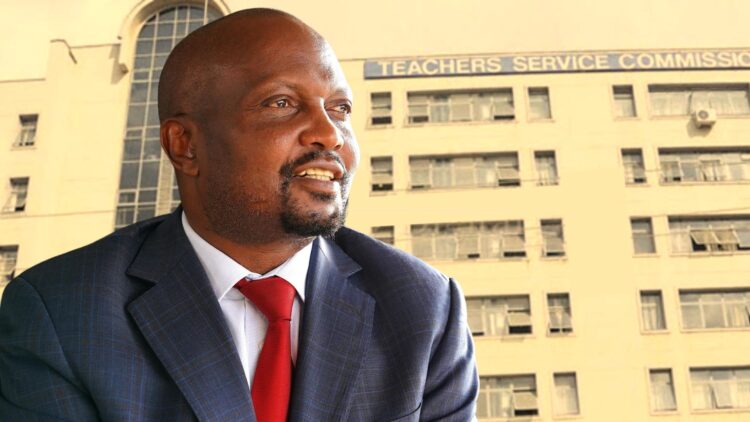Moses Kuria: Politicians Are Trading Teacher Jobs for Votes—TSC Recruitment in Crisis.
In Kenya, the aspiration to become a teacher is increasingly controlled by political forces. Instead of the Teachers Service Commission (TSC), which holds constitutional authority over hiring, members of parliament and local leaders have begun distributing teacher appointment letters at political rallies and funerals.
Senior politician and a Senior Advisor Council of Economic Advisors State House, Moses Kuria made a bold statement on X, condemning fellow leaders for turning teacher recruitment into a populist campaign act. He highlighted that appointment letters were being handed out like campaign merchandise during public events. Shaped by dedicated educators himself, Kuria warned that this trend posed a serious threat to Kenya’s future.
“There are several great ideas on how best to destroy a nation. But the most glittering of recent times is politicians parading teachers employment forms in public rallies and funerals. It’s so sad especially for us the products of great teachers. We have sunk this low, sadly,” he said.
The TSC was created to ensure fair, merit-based teacher hiring. However, lawmakers, including MPs, senators, and governors, have taken matters into their own hands—distributing TSC appointment letters to allies and relatives. Whistleblowers, such as Conrad Kulo, exposed these incidents, and Justice Lucila accused legislators of monopolizing public service opportunities.
Constitutional Breach and Ethical Decline
This practice not only violates ethical standards but also breaches Article 237 of Kenya’s Constitution, which grants TSC exclusive authority over hiring. Politicians who interfere with this process are breaking the law.
Their actions sabotage fairness, with deserving teachers being sidelined in favor of those with political connections. Critics argue that helping through proper TSC channels is acceptable, but hiring should remain fair and humane.
Concerns have been raised about the injustice of favoring recent graduates over teachers who completed training as early as 2010. Union representatives insist that employment should reflect fairness and humanity, especially with many teachers over 50 still unemployed.
Education unions, particularly the Kenya Union of Post Primary Education Teachers (KUPPET), have warned that political involvement in teacher hiring weakens educational quality and disrupts school stability. While the executive has power, unions argue that the distribution of forms by politicians is deeply troubling and damaging to public trust.
This misuse of authority leaves thousands of trained teachers jobless, some of whom have waited over a decade for TSC placement. Meanwhile, students—particularly in under-resourced rural areas—are left to learn under unqualified or politically-appointed educators, worsening the quality of education.
Public Outrage and Online Backlash
Kenyans have expressed their outrage online, using platforms like X to criticize the politicization of teaching jobs. Kuria’s exposé sparked public anger, with citizens insisting that education should not be used as a political pawn. Education stakeholders echoed these sentiments, emphasizing the need to protect TSC’s independence.
The TSC, as an independent constitutional body, has the official mandate to recruit teachers. Recent developments, however, suggest that the Commission may be neglecting its core responsibilities. Observers noted that never before in its history has TSC witnessed such interference, and urgent action is needed for it to fulfill its mandate properly.
This issue is part of a broader pattern of corruption in Kenya’s education sector, plagued by ghost teachers, mismanaged resources, and shady contracts. The Ethics and Anti-Corruption Commission (EACC) flagged TSC hiring irregularities in 2024, opening the door for political manipulation in job allocation.
Read Also: 80% of Mombasa Students Miss Tertiary Education as Senate Gives Governor 7 Days Ultimatum
Despite the chaos, TSC has committed to investigating illegal hires and enforcing stricter oversight. Education stakeholders, including KUPPET, are pushing for reforms like digitized recruitment systems to minimize political interference. However, the challenge lies in reducing the overwhelming influence of politicians in the system.
Kuria’s public call-out may increase pressure on institutions, but lasting change will depend on continued civic vigilance. The central question remains whether Kenya can restore integrity to its education system or whether political interference will continue eroding its foundations. Teachers have long built the nation’s past and will shape its future—but only if they are protected.
Moses Kuria: Politicians Are Trading Teacher Jobs for Votes—TSC Recruitment in Crisis.
Follow Teachers Updates on Facebook, LinkedIn, X (Twitter), WhatsApp, Telegram, and Instagram. Get in touch with our editors at [email protected].



Discussion about this post